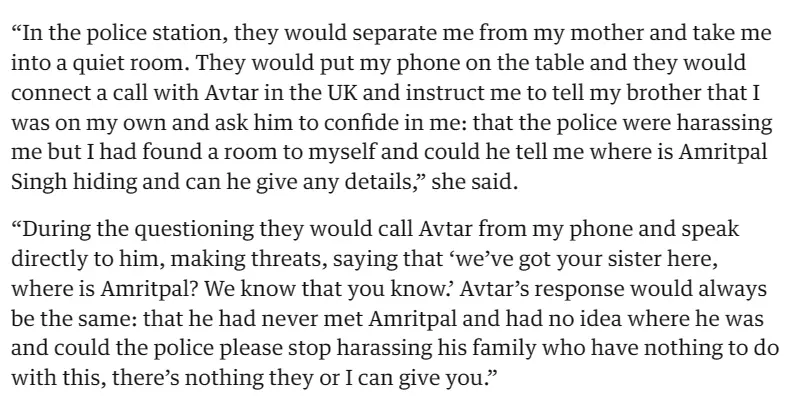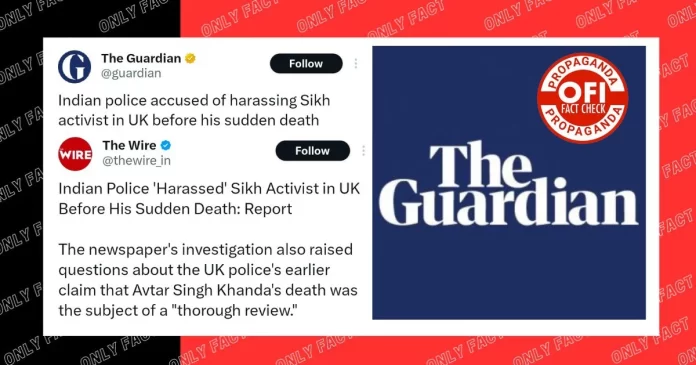In a time when India stands prominently on the global stage, with a soaring GDP and a resounding foreign policy, certain segments of the Western media, notably The Financial Times and The Guardian, appear steadfast in their attempts to undermine the nation’s stature. These publications, often criticized for their imperialistic tendencies, seem resolute in their pursuit to tarnish India’s image.
A recent instance is The Guardian’s publication concerning Avatar Singh Khanda, who passed away in June 2023. Rather than objectively reporting on the event, The Guardian’s narrative appears driven by an apparent desire to capitalize on the momentum generated by a recent Financial Times article. The latter piece alleged the Indian government’s involvement in a plot to assassinate Khalistani terrorist Gurpatwant Singh Pannun on U.S. soil.

In this exposé, we aim to debunk the convoluted article by The Guardian in their recent publication.
The Guardian’s opening gambit entailed a headline and inaugural paragraph highlighting allegations of harassment against the Indian police in the case of Avatar Singh Khanda, who, it is pertinent to note, passed away in June. Implicit in this timeline is the inference that Khanda’s family must have levied accusations prior to his demise. Consequently, the English newspaper in question chose to published an article on the subject more than six to seven months after the initial accusations against the Indian police.
As we delve into the intricacies of these allegations, an examination of The Guardian’s own account reveals a notable self-contradiction, prompting us to scrutinize the veracity of the presented narrative.
Claim:
The Guardian wrote, “A Sikh activist in Birmingham complained that Indian police were verbally harassing him by phone and threatening his family in Punjab months before his sudden death in June, a Guardian investigation has found.”

The article later reads, “Exclusive interviews with Khanda’s mother and sister in India suggest the 35-year-old and his family were the subject of an aggressive intimidation campaign by Indian authorities in the months before his death.”

Fact:
Within its article, The Guardian included a segment extracted from an interview conducted with the mother of Avatar Singh Khanda. Khanda’s mother said, “They repeatedly asked about Avtar: what was he doing in the UK, what were his affiliations?”
“In the police station, they would separate me from my mother and take me into a quiet room. They would put my phone on the table and they would connect a call with Avtar in the UK and instruct me to tell my brother that I was on my own and ask him to confide in me: that the police were harassing me but I had found a room to myself and could he tell me where is Amritpal Singh hiding and can he give any details,” she said.
“During the questioning they would call Avtar from my phone and speak directly to him, making threats, saying that ‘we’ve got your sister here, where is Amritpal? We know that you know.’ Avtar’s response would always be the same: that he had never met Amritpal and had no idea where he was and could the police please stop harassing his family who have nothing to do with this, there’s nothing they or I can give you.”

The interview conducted by The Guardian manifests inherent contradictions as Khanda’s mother and sister recount routine police procedures aligned with the Indian Penal Code (IPC). Noteworthy is the comparatively measured approach of the Indian police towards Khanda’s family, considering his extensive criminal history. Avatar Singh Khanda, a resident of the United Kingdom, transcends the realm of an ordinary Sikh, emerging as a distinguished Khalistani terrorist akin to his father, Kulwant Singh Khukhrana.
According to The Statesman, Kulwant Singh stands accused of orchestrating a tragic event in 1989, where a bomb attack claimed the lives of 25 RSS workers and left 30-35 individuals injured. Kulwant Singh met his demise in 1991 during a confrontation with security forces. Echoing his father’s affiliations, Avatar Singh Khanda, identified as a member of the militant organization Khalistan Liberation Force, featured prominently in the annals of the Babbar Khalsa International (BKI), an outfit banned worldwide, including in Canada, the US, and the UK.

Approximately eight years ago, India furnished the UK with a list of individuals conspiring against the Indian state, a list that included Khanda’s name. He faced accusations of training and radicalizing young individuals. Moreover, Khanda played a pivotal role in the removal of the Indian flag from the high commission in London. As a handler for Khalistani terrorist and chief of Waris Punjab De, Amritpal Singh, Khanda’s connections extended to criminal activities resulting in Singh’s imprisonment on charges under the National Security Act. Singh, with deep ties to Pakistani intelligence services (ISI), was pursued for 35 days in April this year. Consequently, the Indian police’s interrogation of Avatar Singh Khanda’s family, given these intricate connections and activities, appears not only fair but notably lenient.

Claim:
The subsequent narrative propagated by The Guardian suggests that the demise of Avatar Singh occurred under suspicious circumstances, insinuating the possibility of foul play. The Guardian wrote, “ Khanda, who had appeared to be healthy and robust in the weeks before his death, died in Birmingham on 15 June. Three days later, Nijjar was killed in a hail of gunfire in British Columbia as he left his house of worship. No arrests have been made in the case.”

The article reads, “The death of Avtar Singh Khanda, which family and friends have said was suspicious, coincided with a plot that was playing out across the Atlantic where, US prosecutors have alleged, an Indian government official with close ties to Indian intelligence was ordering the murder of high-profile Sikh activists in Canada and the US.”

“Exclusive interviews with friends and family of the activist contradict official statements – including by Foreign Office ministers – that the death was investigated by West Midlands police. They have also revealed that Khanda was considered a close associate by Indian officials of Amritpal Singh, a one-time fugitive Sikh separatist who is considered a terrorist by Indian authorities and has since been arrested. His family staunchly deny any connection between the men.”
“For his friends, fellow Sikh activists and family members, the insistence by British authorities that a deeper investigation is not warranted fails to take into account damning details that have emerged about India’s alleged involvement in a global campaign of transnational repression aimed at Sikh separatists calling for the establishment of an independent Sikh state, known as Khalistan. It is a movement with which Khanda was closely associated, they say.”
Fact:
The Guardian craftily and deviously presented multiple conspiracy theories surrounding Khanda’s death across four to five paragraphs, while discreetly concealing and downplaying pertinent facts in just a few lines. In the following analysis, we will spotlight the contradictory information disclosed within The Guardian’s own article, cross-referenced with reports from other media agencies.
The Guardian wrote, “Officially, Khanda is said to have died of acute myeloid leukaemia, treatment of which was complicated by blood clots, two days after he was diagnosed with the aggressive blood cancer.”

“British authorities have said Khanda’s death in June, four days after he was admitted to Birmingham’s Sandwell hospital feeling unwell and in pain, was the subject of a “thorough review” by police and that there was no reason to suspect foul play.”

“A 20 June letter from the Birmingham coroner’s office to Khanda’s next of kin, which has been seen by the Guardian, said there was “no reason to suspect an unnatural death” based on medical information and “confirmation from West Midlands police that there are no suspicious circumstances surrounding the death”.

The reports from The Guardian have referenced official coroner reports and police statements, affirming that Khanda succumbed to acute myeloid leukemia, an aggressive and fatal form of blood cancer. The gravity of such a disease and its consequential fatality demands a serious consideration, leaving minimal room for speculative theories. In cases where the diagnosis points to acute myeloid leukemia, recognized as the most aggressive type of cancer, the likelihood of foul play or assassination becomes highly improbable.
The Times of India reported, “West Midlands police on Tuesday told TOI: “He was in hospital when he died. It was not deemed to be suspicious at the hospital and his death was referred to the coroner. The police were only even made aware of this because of allegations he was poisoned but he was in hospital for a reason — and that was not poisoning. Our involvement was only because of these allegations. His death is not deemed to be suspicious.”

Birmingham Mail wrote, “Khanda, a prominent Sikh figure who advocated for a separate Sikh homeland of Khalistan, sadly died on June 15. It is reported that Khanda passed away with terminal blood cancer but the official reason is unknown.”
Cbc wrote, “Friends and family say Khanda went to the hospital after he suddenly fell ill and was diagnosed with acute myeloid leukemia — a type of blood cancer. He died four days later of a blood clot, his family says, which is the official determination on his death certificate.”

Conclusion:
The Guardian has delved into the past, resurrecting the circumstances surrounding Khanda’s death and an older interview with his mother and sister in an apparent effort to draw parallels with the recent controversy sparked by the Financial Times. By bringing an antiquated and seemingly resolved case to the forefront, The Guardian endeavors to manufacture a controversy akin to that generated by the Financial Times. The article unfolds by accusatorily asserting in its headline and opening paragraph that the Indian police subjected Khanda’s family to harassment, a claim contradicted by their own interview, revealing a rather lenient interrogation process in light of the family’s history and affiliations.
Furthering its narrative, The Guardian introduces an element of conspiracy surrounding Khanda’s demise, despite ample evidence, including corroborative reports from various media outlets, affirming the cause as acute myeloid leukemia, a severe blood cancer. In conclusion, the article falls short of delivering new insights, relying on recycled information to stir controversy.
Also Read: Has Forbes Declared India as The Most Corrupt Asian Nation in 2023?









